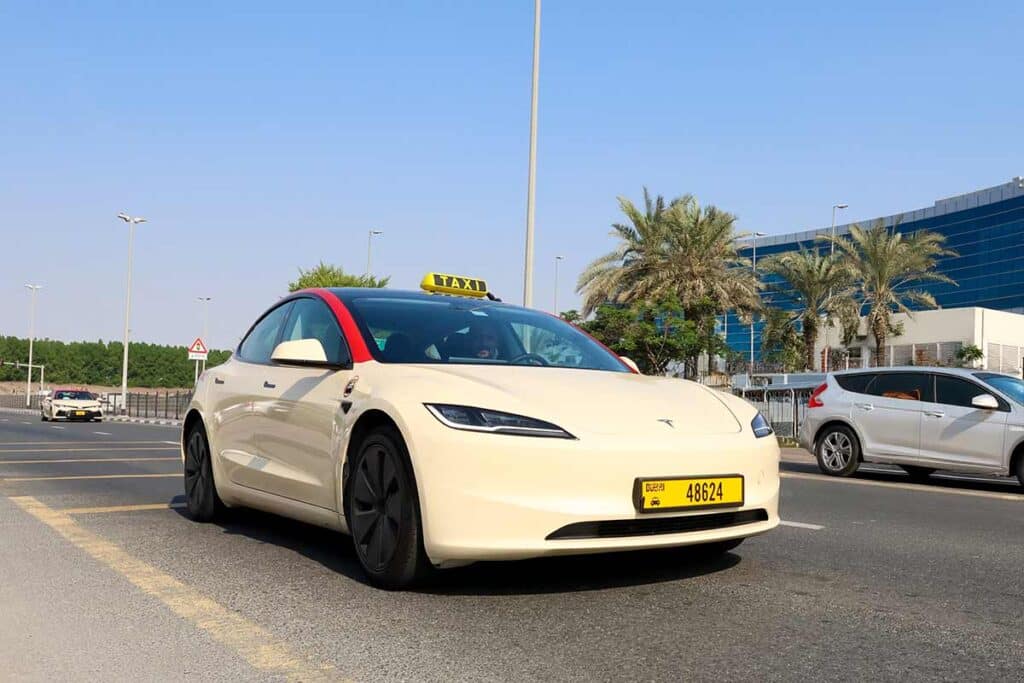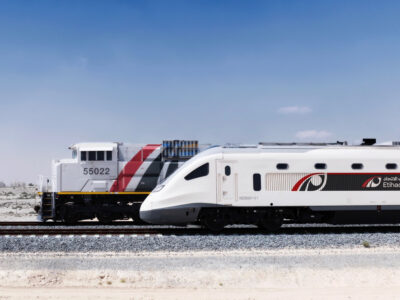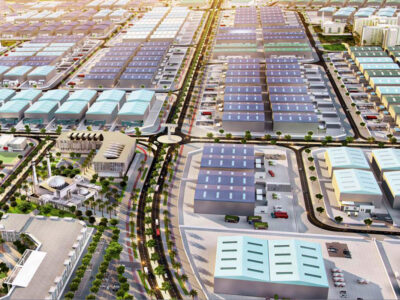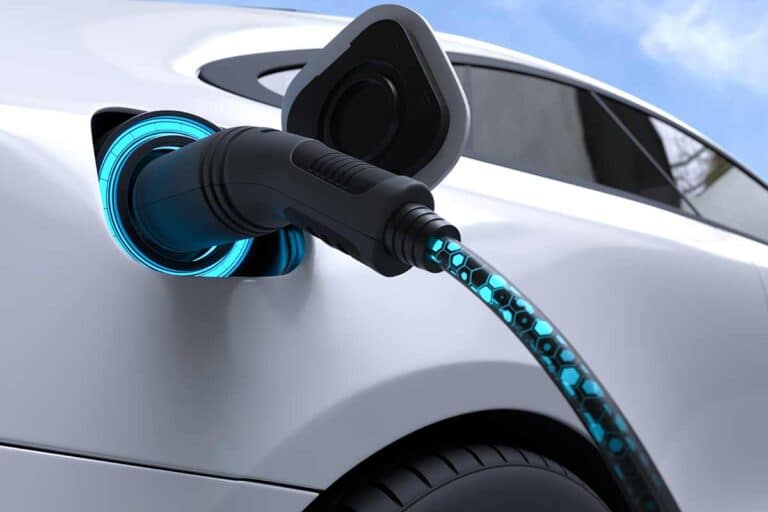Elon Musk just handed China the keys to the United Arab Emirates’ electric vehicle market. His bizarre White House photo-op with Donald Trump — complete with a Tesla test drive and inflammatory rhetoric against protesters — was the final push that Gulf consumers needed to complete their shift to Chinese EVs.
Tesla was already beginning to lose ground in the UAE before Trump entered the picture. BYD, now the world’s largest EV maker with over 3 million vehicles sold in 2024 (compared to Tesla’s 1.8 million), has been rapidly expanding in the Gulf, eroding Tesla’s once-dominant 43 per cent market share. Tesla’s market share in the UAE has dropped from 40 per cent in 2022 to just 16 per cent in 2024, with BYD and NIO taking the lion’s share of new EV registrations. What Musk’s political grandstanding has done is turn a gradual migration into an exodus.
UAE’s EV landscape changes
At Dubai Mall’s parking garages, BYDs and NIOs now vastly outnumber Teslas. Some of my conversations at industry events have revealed a clear trend: executives are ditching Tesla for cheaper, high-tech Chinese alternatives — and increasingly, to avoid Tesla’s political baggage. Local dealerships report that even previously loyal Tesla owners are trading in their vehicles for brands like BYD and XPeng, with many citing reliability, affordability, and Musk’s erratic leadership as decisive factors.
NIO and BYD have opened flagship showrooms across the UAE, with BYD establishing a prominent location on Sheikh Zayed Road alongside new outlets in Abu Dhabi, Al Ain, and Ras Al Khaimah. OMODA and JAECOO plan major 2025 launches through partnerships with local distributor MAHY Khoory Automotive. Prices start at just AED 85,000 ($23,000) for models like the BYD Qin Plus and JAC E30X, making Chinese EVs far more accessible than Tesla’s entry-level models.
Even Dubai Taxi Corporation, once a major Tesla customer, has diversified its fleet to include a mix of EVs, favouring cost-efficient and scalable options. Fleet operators in Saudi Arabia and Qatar are making similar moves, aligning their investments with market shifts rather than brand loyalty. The UAE government’s ambitious sustainability targets — converting 50 per cent of government vehicles to electric by 2030 — are further accelerating this shift, with Chinese manufacturers’ competitive pricing and rapid delivery capabilities making them the default choice.

Growing UAE-China trade
Meanwhile, the UAE-China economic cooperation continues to grow, with bilateral trade exceeding $90 billion in 2024, up from $72 billion in 2022. China remains the UAE’s top non-oil trading partner, and its growing influence in the region extends to EVs. The UAE’s free trade talks with China signal further economic integration, making it even easier for Chinese automakers to enter, and potentially dominate, the market.
This goes beyond consumer preferences. It is a geopolitical reality reshaping the global EV landscape. China’s dominance of the EV supply chain — controlling 65 per cent of global lithium processing despite having access to only 25 per cent of resources — has given its automakers an insurmountable cost advantage. BYD already makes $8,000 in profit per car while undercutting Tesla’s prices, offering Gulf consumers better value without the political drama. The Chinese government’s support for its domestic EV sector through aggressive subsidies and vertical integration has created a juggernaut that Western automakers are struggling to compete with.
What’s particularly striking is how Chinese manufacturers have repositioned themselves in the Gulf’s luxury-oriented market. These aren’t marketed as budget alternatives but as premium technology showcases. The AVATR 11 SUV and AVATR 12 Gran Coupe, recently introduced in the UAE with prices starting at AED 250,000, exemplify this strategy with their Huawei and Lenovo-developed technology packages that appeal to tech-forward consumers.
But this supply chain dominance isn’t accidental. China has systematically secured critical lithium supplies across South America’s “Lithium Triangle” and is rapidly expanding into Africa’s emerging reserves. Chinese companies have invested heavily in Zimbabwe’s Bikita lithium mine and similar deposits, often combining these investments with infrastructure development that cements their influence.

Tesla’s growing brand erosion mirrors its financial troubles. Its stock has plummeted for eight consecutive weeks, losing 41 per cent of its value — the worst streak in its history. After initially rising from $250 to $490 between November and mid-December 2024 on post-election optimism, Tesla shares have collapsed amid weak sales and Musk’s controversial political activities. Musk’s desperate price cuts, intended to boost demand, have backfired by eating into Tesla’s margins while failing to slow BYD’s momentum.
Meanwhile, Gulf sovereign wealth funds are recalibrating. Saudi Arabia’s Public Investment Fund is backing Lucid Motors, with prices for the Lucid Air starting at AED299,000 and its first direct-to-consumer retail outlet already open in Dubai. The UAE’s Mubadala has similarly diversified beyond Tesla, recognizing that the Gulf’s $9.53 billion EV market is shifting decisively toward China.
The shift has been so dramatic that premium residential buildings in Dubai are rapidly expanding their EV charging infrastructure specifically to accommodate the influx of Chinese models. A property manager at a luxury tower in Downtown Dubai told me they’ve installed more than 10 new charging stations in the past few months, with the majority configured to Chinese EV specifications.
Musk’s moves hurt Tesla
The change in consumer sentiment is striking. Five years ago, Chinese cars were dismissed as inferior. Now, local investors praise their build quality, intuitive interfaces, and advanced technology. Gulf buyers, historically drawn to luxury brands as status symbols, are embracing Chinese EVs for their sleek designs and cutting-edge tech. Musk’s political antics have removed the last barrier for status-conscious Gulf buyers: no one wants to be seen as financially imprudent or politically tone-deaf.
The UAE’s business community, which prides itself on political pragmatism, economic foresight, and maintaining balanced international relationships, has been particularly repelled by Musk’s partisan positioning. At a recent industry forum in Dubai, several executives openly discussed their concerns with me about how their continuing to drive Teslas might wrongly signal their own political alignment with Musk’s controversial stances.

For Tesla, the timing couldn’t be worse. The UAE and Saudi Arabia are aggressively ramping up their EV infrastructure, investing billions in charging networks, incentives, and green energy initiatives. The GCC’s vision for a post-oil future aligns seamlessly with China’s EV ambitions, while Musk’s alignment with Trump’s protectionist policies makes Tesla an awkward fit in an increasingly China-friendly region.
The market trajectory mirrors what happened in Europe. Chinese manufacturers entered 2023 with barely 3 per cent of Europe’s EV market. By year-end, they commanded nearly 20 per cent. Projections for 2024 showed them capturing 25 per cent of that market — but their penetration in the UAE has been even faster and deeper.
Musk may have secured Trump’s favour, but in doing so, he has accelerated Tesla’s decline in international markets that it cannot afford to lose. The UAE’s business elite values pragmatism and neutrality. Tesla now represents neither. As Chinese automakers solidify their foothold in the Gulf, Tesla’s path back into favour looks increasingly difficult. The UAE’s pivot to Chinese EVs, which was a year ago just a trend, has now become the new reality.
For investors, the message is clear: when economic fundamentals already favour your competitors, injecting political risk is corporate malpractice. Musk’s White House spectacle may have secured his standing in Washington, but in the Gulf, it has sealed Tesla’s fate as an also-ran in the Chinese EV takeover.









